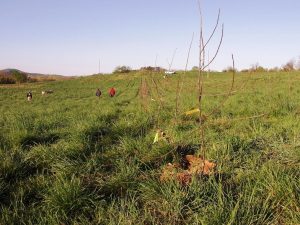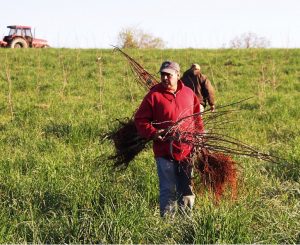Good Friday at Holy Cross Abbey is always a special day, but even more so when 2,000 apple tree seedlings find their way onto the monastery’s 110-acre produce farm.
Farming partner Mark Zurschmeide and his team took advantage of the crystal-clear Friday morning to begin planting four-foot tall apple tree seedlings in neat rows that stretch along the gently rolling hills of what was until recently a former cow pasture. Remnants of frost on the pasture grass quickly melted away as a warm spring sun gained altitude above the Blue Ridge just beyond the nearby Shenandoah River.
Farm workers in teams of two followed a precise planting process to ensure that the young half-inch diameter trees will have the best chance of surviving to produce apples. The workers first dig a hole where the tree’s roots are placed. Next, dirt is carefully packed around the base of the sapling to ensure that all of the roots are covered. Young root tendrils left exposed to the air and sun will quickly wither from dryness. Finally, the hole for the next tree is dug at a pre-defined distance from the previous tree to ensure that the trees do not shade each other from the sun and also to allow unhindered access for farm equipment that will later be used to maintain and harvest the crop.
“The trees will bear fruit this year,” said Great Country Farms chief farming officer Mark Zurschmeide. “But we’ll pick the small apples this fall before they ripen so that the tree uses its energy to grow rather than produce fruit.”
Zurschmeide recited a veritable fruit salad of apple varieties being planted at the Abbey including Gala, Empire, Jonagold and Fuji.
The field that Zurschmeide has selected for the new orchard is a near textbook prototype of the geography needed to produce sweet, crisp fruit. The new 30-acre orchard has a 50-foot elevation change from its northwest corner to the southeast. Orchard farmers have traditionally selected this type of rolling topography in order to take advantage of air movement caused when gravity forces pockets of cool air and warm air to move up and down hillsides at night. This natural movement of warm and cold pockets of air can make just enough difference to keep the tender spring buds from succumbing to a late season frost. The air movement also helps protect the trees certain diseases and pests.
While the rolling terrain may help protect the trees from cold temperatures, it offers little protection against the many bands of deer that routinely wonder the farm. But Zurschmeide is prepared for the deer as well as the cold. Several dozen rolls of deer fencing lie nearby waiting to be installed once the apple trees are in place.



